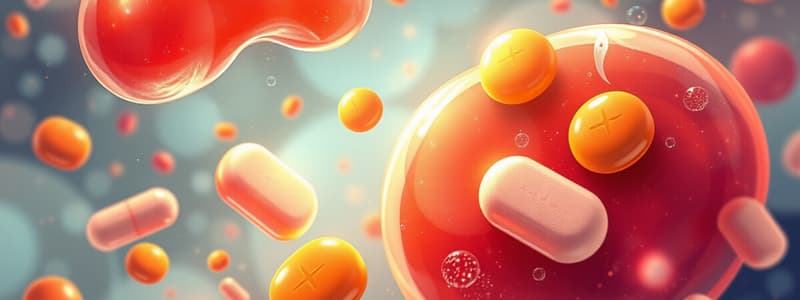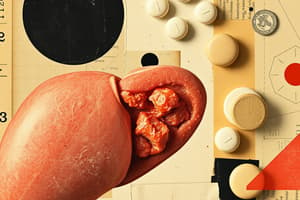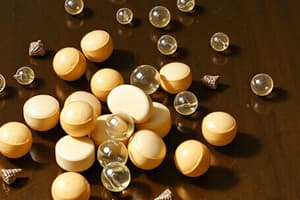Podcast
Questions and Answers
What is the primary mechanism by which statins lower LDL cholesterol levels?
What is the primary mechanism by which statins lower LDL cholesterol levels?
- They increase cholesterol production in the liver.
- They decrease the number of LDL receptors on hepatocytes.
- They promote the synthesis of triglycerides.
- They inhibit HMG-CoA reductase activity. (correct)
What compensatory mechanism occurs in response to statin therapy?
What compensatory mechanism occurs in response to statin therapy?
- Increased number of LDL receptors on hepatocytes. (correct)
- Increased production of very low-density lipoprotein (VLDL).
- Decreased absorption of dietary fats.
- Decreased liver enzyme activity.
Which of the following adverse effects is commonly associated with statin use?
Which of the following adverse effects is commonly associated with statin use?
- Increased production of LDL.
- Myalgia and headache. (correct)
- Decreased creatine kinase levels.
- Decreased risk of hepatic dysfunction.
What happens to VLDL production as a result of statin therapy?
What happens to VLDL production as a result of statin therapy?
Which statin is known for its longest half-life, allowing for flexible dosing?
Which statin is known for its longest half-life, allowing for flexible dosing?
What should patients be monitored for while on statin therapy?
What should patients be monitored for while on statin therapy?
Why is it advised to take statins at night?
Why is it advised to take statins at night?
What drug class do statins belong to?
What drug class do statins belong to?
Which of the following is true about high-density lipoprotein (HDL)?
Which of the following is true about high-density lipoprotein (HDL)?
What potential risk is associated with statin use concerning pregnancy?
What potential risk is associated with statin use concerning pregnancy?
What is the primary mechanism of action (MOA) of bile acid-binding resins like Colestipol, Cholestyramine, and Colesevelam?
What is the primary mechanism of action (MOA) of bile acid-binding resins like Colestipol, Cholestyramine, and Colesevelam?
Which of the following accurately describes the mechanism of action of Ezetimibe?
Which of the following accurately describes the mechanism of action of Ezetimibe?
How do bile acid-binding resins like Cholestyramine primarily affect LDL receptors?
How do bile acid-binding resins like Cholestyramine primarily affect LDL receptors?
What is the primary mechanism by which fibrates exert their effect on triglyceride levels?
What is the primary mechanism by which fibrates exert their effect on triglyceride levels?
What is one consequence of using Ezetimibe in terms of its effect on triglycerides?
What is one consequence of using Ezetimibe in terms of its effect on triglycerides?
What is the mechanism by which Niacin lowers triglyceride levels?
What is the mechanism by which Niacin lowers triglyceride levels?
Which enzyme's activity is inhibited by Niacin in the liver, leading to decreased VLDL production?
Which enzyme's activity is inhibited by Niacin in the liver, leading to decreased VLDL production?
Which statement regarding the mechanism of action of Colesevelam compared to other bile acid-binding resins is accurate?
Which statement regarding the mechanism of action of Colesevelam compared to other bile acid-binding resins is accurate?
What is the consequence of activating peroxisome proliferator activated receptors (PPARα) in relation to triglycerides?
What is the consequence of activating peroxisome proliferator activated receptors (PPARα) in relation to triglycerides?
Which adverse effect is commonly associated with high doses of Niacin?
Which adverse effect is commonly associated with high doses of Niacin?
What is the major adverse effect associated with bile acid-binding resins?
What is the major adverse effect associated with bile acid-binding resins?
How long does it typically take for Ezetimibe to reach peak blood levels?
How long does it typically take for Ezetimibe to reach peak blood levels?
What is a potential gastrointestinal side effect of fibrates?
What is a potential gastrointestinal side effect of fibrates?
Which of the following vitamin absorbance is least affected by the use of bile acid-binding resins?
Which of the following vitamin absorbance is least affected by the use of bile acid-binding resins?
How does Niacin affect glucose tolerance?
How does Niacin affect glucose tolerance?
Which condition is a contraindication for the use of Niacin due to potential exacerbation of symptoms?
Which condition is a contraindication for the use of Niacin due to potential exacerbation of symptoms?
What mechanism leads to gallbladder issues in patients taking Clofibrate?
What mechanism leads to gallbladder issues in patients taking Clofibrate?
What is an important reason to avoid combining fibrates with statins?
What is an important reason to avoid combining fibrates with statins?
What role does Omega-3 fatty acids play regarding triglycerides?
What role does Omega-3 fatty acids play regarding triglycerides?
What is one of the primary goals of treatment for hyperlipidemia?
What is one of the primary goals of treatment for hyperlipidemia?
Which lipoprotein level is targeted to be higher than 60 mg/dl in hyperlipidemia management?
Which lipoprotein level is targeted to be higher than 60 mg/dl in hyperlipidemia management?
How do Apo-proteins contribute to lipid metabolism?
How do Apo-proteins contribute to lipid metabolism?
Which factor can lead to disrupted lipid metabolism and increased LDL cholesterol?
Which factor can lead to disrupted lipid metabolism and increased LDL cholesterol?
Which type of familial hyperlipidemia is characterized by elevated levels of triglycerides?
Which type of familial hyperlipidemia is characterized by elevated levels of triglycerides?
What can excessive alcohol intake do regarding lipid levels?
What can excessive alcohol intake do regarding lipid levels?
What is one effect of smoking on cholesterol levels?
What is one effect of smoking on cholesterol levels?
What is a common environmental factor that can contribute to hyperlipidemia?
What is a common environmental factor that can contribute to hyperlipidemia?
Which type of familial hyperlipidemia is known for mixed lipid disorders?
Which type of familial hyperlipidemia is known for mixed lipid disorders?
Which statement about genetic factors in hyperlipidemia is accurate?
Which statement about genetic factors in hyperlipidemia is accurate?
Flashcards are hidden until you start studying
Study Notes
Bile Acid Sequestrants
- Colestipol, Cholestyramine, and Colesevelam bind bile acids to form insoluble complexes, preventing fat emulsification and reabsorption.
- Upregulation of LDL receptors facilitates increased cholesterol extraction from the bloodstream.
- Side effects include abdominal discomfort, bloating, constipation, and decreased absorption of fat-soluble vitamins (A, D, K); HDL levels remain unchanged.
- Drug interactions primarily affect absorption of statins and ezetimibe, with Colesevelam being the exception.
- Contraindications: complete biliary obstruction, cholelithiasis, chronic constipation, and severe hypertriglyceridemia (TG >400 mg/dL).
Cholesterol Absorption Inhibitors
- Ezetimibe decreases LDL by 20%, triglycerides by 8%, and increases HDL by 1-4%.
- Mechanism of action involves reducing cholesterol reabsorption via enterohepatic circulation and upregulating LDL receptors.
- Takes 12-14 hours to reach peak blood levels with a half-life of 22 hours; most is excreted in feces.
- Indicated as monotherapy for primary prevention in low-risk coronary heart disease and in combination with statins or other lipid-lowering agents.
- Side effects are generally not common.
Niacin (Vitamin B3)
- Mechanism of action involves binding to adipose nicotinic acid receptors leading to decreased mobilization of free fatty acids and lower triglyceride levels.
- Niacin affects metabolism of various lipoproteins, including chylomicrons, VLDL, LDL, and HDL, with HDL regarded as "good" cholesterol.
- Side effects include cutaneous flushing, gastrointestinal discomfort, hepatotoxicity, and potential glucose tolerance impairment.
Statins (HMG-CoA Reductase Inhibitors)
- Statins are first-line therapies for lowering LDL cholesterol in patients.
- Mechanism includes inhibition of HMG-CoA reductase, resulting in increased LDL receptor expression and decreased production of VLDL.
- Common statins: Rosuvastatin, Atorvastatin, Simvastatin, Pravastatin, and Lovastatin.
- Pharmacokinetics involve high first-pass metabolism by the liver and significant protein binding.
- Side effects may include headaches, myalgia, hepatotoxicity, myopathy, and teratogenicity.
Fibrates (Fibric Acid Derivatives)
- Fibrates act as agonists of peroxisome proliferator-activated receptors (PPARα), regulating lipoprotein lipase expression and increasing triglyceride catabolism.
- Common examples: Clofibrate, Gemfibrozil, and Fenofibrate.
- Side effects include gastrointestinal issues, myositis, renal toxicity, and gallbladder complications (especially with Clofibrate).
Omega-3 Fatty Acids
- The prescription medication Lovaza contains Omega-3, which lowers triglyceride levels.
Hyperlipidemias
- Hyperlipidemia refers to elevated levels of lipids in the blood, influenced by genetic factors and environmental influences (e.g., diet, physical inactivity).
- Familial hyperlipidemia has multiple types, like Type I (hyperchylomicronemia) and Type II (hypercholesterolemia).
- Treatment goals focus on reducing lipoprotein production, enhancing catabolism, and lowering cholesterol levels, targeting below 200 mg/dL for total cholesterol and below 130 mg/dL for LDL.
Lipoproteins and Apo-proteins
- Lipoproteins consist of lipids and Apo-proteins, crucial for lipid metabolism and transport.
- Apo-proteins provide structural stability, facilitate lipid transport, and act as cofactors for metabolic enzymes.
Studying That Suits You
Use AI to generate personalized quizzes and flashcards to suit your learning preferences.





